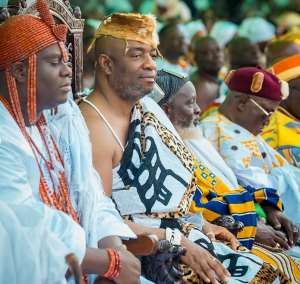
Ghana, a vibrant tapestry woven from centuries of rich traditions, languages, customs, and artistry, stands as a beacon of cultural diversity on the African continent. From the pulsating rhythms of the kpalongo drums in the south to the solemn dirges of the Kasena Nankana people in the north, Ghana’s cultural heritage is not merely a relic of the past — it is the living, breathing soul of the nation. Yet, this soul is under threat, not from external forces, but from within: chronic underfunding, institutional neglect, and a prevailing underappreciation of culture as a driver of national development have left the custodians of our heritage — the Centres for National Culture (CNCs) — grappling with daunting resource constraints.
Ghana is a mosaic of over 100 ethnic groups, each with its own language, traditions, attire, music, dance, folklore, festivals, and culinary heritage. This plurality is not a source of division, but a fountain of strength and identity. From the regal splendour of the Ashanti kingdom and the spiritual wisdom of the Ewe to the enduring resilience of the Dagaaba, every ethnic enclave contributes a unique strand to the Ghanaian cultural fabric.
Festivals such as Homowo, Damba, Aboakyer, Fao, Feok and Hogbetsotso are not mere entertainment; they are cultural archives — intergenerational vessels of memory, values, and social cohesion. Our crafts — kente weaving, beadmaking, pottery, wood carving — are masterful expressions of indigenous knowledge systems and aesthetic sensibilities. The oral traditions of our elders, the proverbs that shape our moral compass, and the rites of passage that define our communal life are invaluable intangible assets.
In recognition of the need to safeguard this treasure trove, the government established the Centres for National Culture (CNCs) as the institutional guardians of Ghana’s cultural heritage. Mandated to promote, develop, preserve, and disseminate Ghanaian culture at the regional and national levels, the CNCs are strategically positioned to foster cultural renaissance. However, these noble institutions have been hamstrung by a perennial lack of resources.
Many CNCs operate from dilapidated buildings, lacking modern facilities for performing arts, exhibitions, and archival storage. Cultural officers are often under-resourced, undertrained, and overburdened. Programmes intended to unearth and promote local talents frequently collapse due to budgetary constraints. In many regions, the CNCs are unable to adequately engage the youth or harness the creative economy, not because of a lack of vision or capacity, but because the lifeblood of funding has been meager or inconsistent.
In an era of globalization and rapid digital change, cultural preservation is not a luxury — it is a necessity. Culture is the soul of a nation; it provides the ideological scaffolding on which national identity, social unity, and development are anchored.
Culture as an Economic Driver: The creative arts and cultural tourism sectors hold immense potential to diversify Ghana’s economy. Countries that have invested in culture — such as South Korea, Brazil, and India — have reaped vast economic benefits through film, music, fashion, and heritage tourism. Ghana is no exception. With proper investment, CNCs can be transformed into hubs of cultural entrepreneurship, training young people in creative skills, generating employment, and attracting both local and international patronage. Cultural Diplomacy: Ghana’s international image is often associated with its cultural icons — from Kwame Nkrumah’s Pan-African vision to Azonto and Afrobeats. Prioritizing culture in foreign policy can strengthen Ghana’s soft power, enhance global partnerships, and project a positive national brand. Social Cohesion and Identity: In a politically polarized and increasingly individualistic world, culture has the power to bind us together. It is through cultural rituals, festivals, and storytelling that we remember who we are and affirm our collective humanity. Strengthening the CNCs would ensure that this vital work of cultural education and national cohesion is sustained and expanded. Cultural Education and Moral Renaissance: Ghanaian culture embodies values of respect, community, discipline, and integrity — values sorely needed in today’s ethical climate. CNCs can be key partners in reviving moral consciousness through culturally grounded educational programs, especially among the youth.
The government must reimagine its cultural policy with boldness and urgency. This entails:
Substantial and sustained budgetary allocations to the National Commission on Culture and its regional CNCs. Infrastructure investment to modernize cultural centres and make them fit-for-purpose in the 21st century. Capacity building for cultural workers and traditional artists. Strategic partnerships with academia, private sector, and international cultural bodies. Incentives for youth participation in the creative and cultural industries.
Failure to act would be tantamount to cultural amnesia — a betrayal of our ancestors and a disservice to future generations.
Ghana’s cultural wealth is not just an inheritance; it is a tool for transformation. If properly harnessed, it can serve as a foundation for national pride, economic empowerment, and global relevance. But this can only be achieved if the government accords culture the priority it deserves — not as a peripheral concern, but as a pillar of development. The diversity of Ghanaian culture is our strength; investing in its preservation and promotion is our collective responsibility.
Let us not allow the silence of broken drums and crumbling folklore to become the epitaph of our identity. Let us, instead, amplify the rhythms of our heritage — boldly, proudly, and sustainably.


